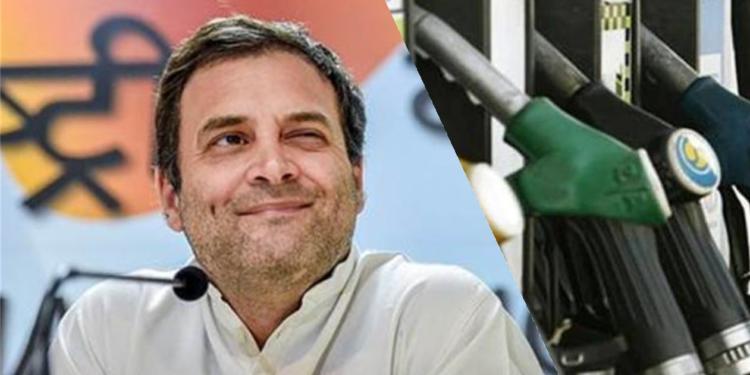In a latest poll gimmick, Rahul Gandhi promised a quasi-Universal Basic Income to 20 percent of Indian families from the poorest strata of society. There are almost 25 crore families in the country and 20 percent of this means that 5 crore families will benefit from Rahul Gandhi’s proposed scheme. Gandhi said that every family will get 72,000 crore rupees. The total cost of the scheme would be around 3.6 lakh crore rupees which is around 1.9 percent of country’s GDP or 14 percent of central government’s expenditure. Rahul Gandhi obviously did not explain any plans on how the money for the scheme will be collected.
If Congress comes to power, the government might increase the taxes on petrol and diesel because they are the easiest source for the government to raise money. Currently, Central government imposes fixed central excise duty on petrol and diesel, which is currently Rs 19.16 per litre on petrol and Rs 16.19 per liter for diesel. The central government earned 2.29 lakh crore rupees from excise duty on petrol and diesel. If the government needs another 3.6 lakh crore rupees it will raise the taxes on these products. If the excise duty on petrol and diesel is doubled then the government will be able to earn 2.3 lakh crore rupees. For the remaining amount of 1.3 lakh crore rupees, the government needs to increase the excise duty by 60 percent.
The current price of petrol is 78.48 rupees per liter in Mumbai, the financial capital of the country. If Congress needs to collect money for its income scheme it would have to increase the tax by 160 percent or 31 rupees on petrol and diesel. So, if Congress comes to power and implements its flagship quasi Universal Basic Income scheme, the effective price of petrol in Mumbai would be around 110 rupees. The price of diesel which is 69.64 rupees per liter in the city would increase by 160 percent and reach around 95 rupees per liter after the implementation of Congress’ income scheme.
Congress government has a good precedent of increasing the taxes on petrol and diesel to finance the welfare policies. The first thing ‘Gathbandhan’ government did in Karnataka was to increase taxes on petrol and diesel, to finance farm loan waivers of 44,000 crore rupees. Rahul Gandhi’s repeated attack on the Modi government over rising fuel prices looked hypocritical as the alliance government in Karnataka had increased the taxes. The backlash from people forced the government to withdraw the decision. However, the Karnataka government has once again increased taxes on petrol from 28.75 to 32 percent and on diesel 17.73 percent to 21 percent. As the central government and BJP governments in states have reduced the price on petroleum products, the Congress government reduced the prices once again. But given the exponential increase in expenditure due to inefficient welfare policies, the government had to increase taxes once again. This is the third time Congress-JD(S) alliance government increased the tax on petroleum products in less than a year.
If Congress comes to power riding on the poll promise of quasi UBI, the government will increase the taxes on petrol and diesel. The price of petrol will reach around 110 rupees per liter in Mumbai if Congress implements its flagship scheme.




























